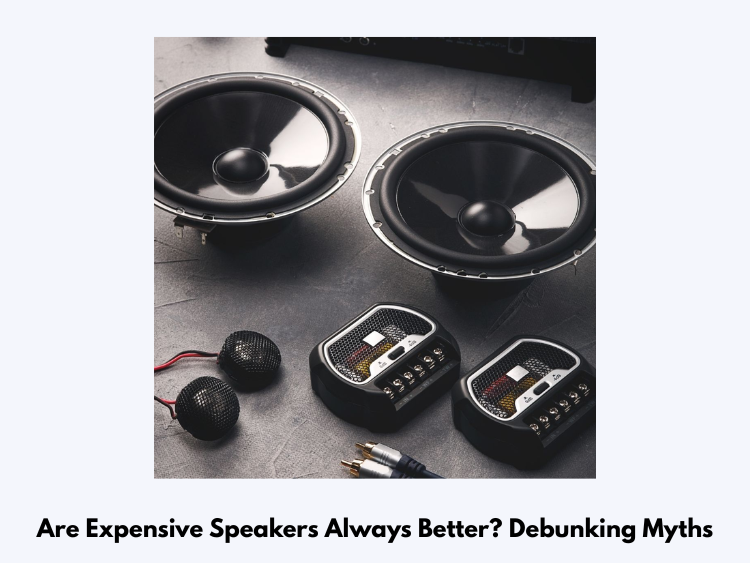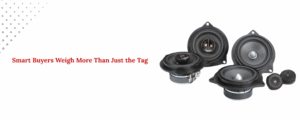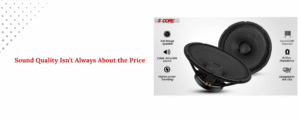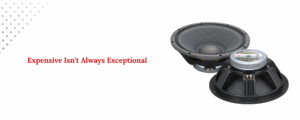Few debates in audio are as old as the one about expensive speakers. Some say they sound way better, while others—especially budget-minded listeners—believe cheaper ones can perform just as well. So, do pricey speakers always sound better? The short answer: not always. Let’s clear up some common myths and see what those high prices actually mean.
Price vs. Performance Speakers: What Really Matters?
Many people think that something that costs more must always be of better quality. Although it’s true that high-end names usually use better materials and more advanced tech, there isn’t a straight line between price and sound quality. For most people, a $5,000 speaker might not sound five times better than a $1,000 speaker.
Costs of production, marketing, company image, and even how something looks all play a big role in price. Some high-end speaker brands charge higher costs for their artistry and lack of availability than for their better sound quality.
To explore quality options at different price points, consider reviewing some of the best replacement speakers for home audio in 2025.
Myth 1: More Expensive Speakers Always Sound Better
Sound clarity is very personal. For some, what sounds clear and full might be too harsh or bass-heavy for others. More accurate music may come from more expensive speakers, but whether that makes the experience better rests on the user and their surroundings.
Just as much, if not more, than the price of the speakers, the sound is affected by how the room sounds, where you put the speakers, and your amplifier or receiver. A reasonably priced setup set up correctly in a well-treated room can do better than a high-end system in a bad room.
Myth 2: Cheap Speakers Can’t Be Good
Thanks to improvements in audio technology and manufacturing, many inexpensive speakers now work very well. Models from brands like ELAC, Klipsch, and Q Acoustics that are easy on the wallet have been praised by both customers and reviewers.
Manufacturers can put more value into cheaper packages than ever before thanks to new drivers, better cabinet design, and digital tuning. A lot of people won’t notice a big difference between a $300 speaker system and a $3,000 speaker system for everyday listening, unless they have trained ears or listen critically in a room with perfect sound.
For more on performance options across categories, especially for vehicles, you can check out the top 5 car replacement speakers for superior sound quality in 2025.
Myth 3: Stereophiles Can Always Tell the Difference
Blind listening tests have shown that even experienced audiophiles can’t tell the difference between mid-range and high-end speakers when they don’t know which ones they are. This doesn’t mean that all speakers sound the same, but it does show how brands and standards can change how people hear things.
You’ll probably think a speaker sounds better if someone tells you it costs $10,000, even if it doesn’t. This effect on the mind is real in the audio world. It’s called the placebo effect.
Myth 4: Paying More for a Speakers Pays Off
This doesn’t mean that costly speakers are a waste of money. The cost may be worth it for workers, audiophiles, or anyone else who really values high-quality sound. A lot of high-end speakers have:
- The drives, switch networks, and panel finishes are made of better materials.
- Durability means that the construction will last for decades.
- Precision engineering: Better clarity, image, and audio.
Additionally, high-end speakers usually work best in big rooms or unique home theaters, where cheaper choices might not be able to fill the room properly.
The Real Question: What Do You Need?
It’s not helpful to ask if more expensive speakers are better. A better question is what you need from your speakers.
If you live in a small room and just want to listen to podcasts or Spotify tracks, a $300 pair of desk speakers might be enough. You might want to spend more on materials if you’re making a listening room or home theater, though.
Also think about:
- Music taste: If you like music with a lot of bass, you might want to tune your speakers or add more subwoofers. Learn more about speaker types in this comparison: Which Do You Need – A Woofer or a Subwoofer?
- Source quality: Even the best speakers won’t make lossy MP3s sound great. You might not hear the benefits of high-end gear if you don’t feed it high-resolution music.
- Setting up the room: Acoustic solutions, the right arrangement, and having the right parts can get you much better sound quality than just buying more expensive speakers.
Conclusion
It’s not true that more expensive speakers are better; they’re just different. Price isn’t just a reflection of performance, and while high-end models can sound great, most users don’t need them or even clearly prefer them.
Today, smart shoppers can find speakers that sound great at almost any price. Don’t just buy something because of the brand name or the price tag; make sure it fits your needs, surroundings, and expectations.




